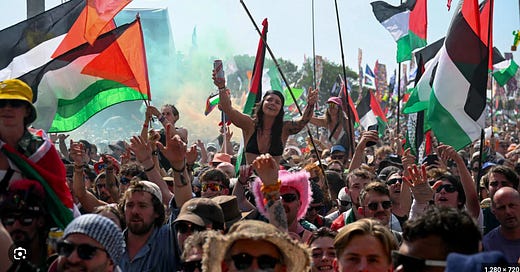If a crowd chanting for the death of Israeli soldiers on live TV — not in Tehran, but at Glastonbury — doesn’t set off alarm bells, what will?
There’s something grotesque about watching thousands of middle-class Britons gathered in a field, chanting “Death to the IDF” like a karaoke sing-along.
This is what antisemitism looks like now: not angry men in jackboots, but smiling progressives in crop tops and keffiyehs, repeating slogans they don’t understand in a ritual of moral self-congratulation.
These aren’t radicals. They’re moral tourists — high on the feeling of righteousness, playing dress-up with other people’s trauma, and wearing the language of resistance like a wristband.
It’s less about sympathy for Palestinians and more about what the cause does for the believer. A free hit of virtue. The rush of moral superiority wrapped in a borrowed identity. Maybe even a flicker of transcendence — all without the burden of practical responsibility or moral complexity. It’s a revealing psychological posture, and one that increasingly defines the progressive Left.
As Ayaan Hirsi Ali notes, the deeper movement they’re unknowingly legitimising isn’t driven by empathy or peace, but by “Maoist principles and Islamist grievances.” A fusion of ideological puritanism with religious absolutism, optimised for virality and soaked in moral certainty. It doesn’t need coherence. It only needs a target.
The chant — “From the river to the sea” — is not a mystery. It has a meaning. But if you asked these revellers which river and which sea, you’d get a blank stare. Ask them what the slogan means, and they’ll splutter something about genocide — of Palestinians. But this was never about understanding complex geopolitics. It’s not rage that drives them, but the narcotic pull of groupthink — of being on “the right side of history.”
Meanwhile, Jewish students are harassed on campuses. Kosher restaurants are defaced. Jewish families dining in London or New York are confronted, filmed, and asked to explain themselves. “Zionist” becomes a slur.
The worst part is, they think they’re doing good. They think chanting a Hamas slogan makes them part of the resistance. They think draping a keffiyeh over their shoulders is a moral act.
But what begins as a chant at a festival ends with smashed windows. Not because this particular crowd is violent, but because they’re creating a moral climate where violence feels justified. Even noble.
This is how it starts. Not with jackboots or manifestos, but with slogans and symbols. With the slow normalisation of hate in spaces that pretend to stand for peace and progress.
Hirsi Ali warns that the next pogrom won’t begin with a uniform, but with a whisper. A meme. A chant at a music festival.
And by the time these revellers realise what they were cheering for, it might be too late.





We’ve reached a point where chanting for someone’s death counts as virtue signalling. That should scare people more than it seems to. Great post.
Excellent analysis. This is it in a nutshell:
*It’s less about sympathy for Palestinians and more about what the cause does for the believer. A free hit of virtue. The rush of moral superiority wrapped in a borrowed identity. Maybe even a flicker of transcendence — all without the burden of practical responsibility or moral complexity. It’s a revealing psychological posture, and one that increasingly defines the progressive Left.*